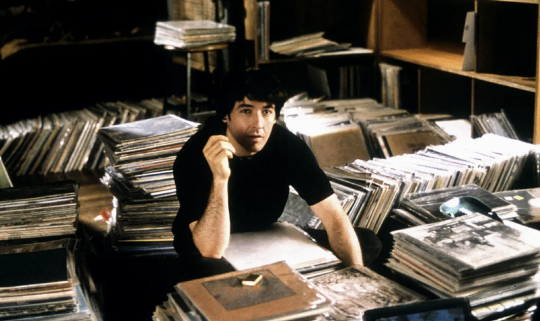It’s Arrested Development: How ‘High Fidelity’ Has Endured Beyond Its Cultural Sell-By Date by Vikram Murthi
By Yasmina Tawil
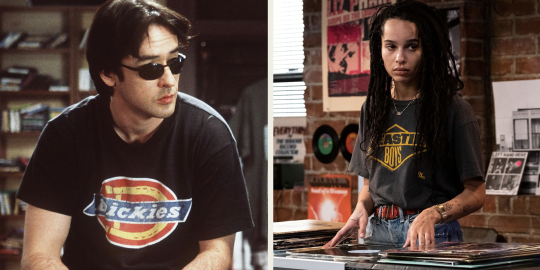
It’s easy to forget now that at the beginning of 2020, before the pandemic had taken hold of our consciousness, for a brief moment, High Fidelity was back. Not only did Nick Hornby’s debut novel and Stephen Frears’ film adaptation celebrate major milestones this year — 25th and 20th anniversaries, respectively — but a TV adaptation premiered on Hulu in February. In light of all of these arbitrary signposts, multiple thinkpieces and remembrances litigated Hornby’s original text on familiar, predictable grounds. Is the novel/film’s protagonist Rob actually an asshole? (Sure.) Does Hornby uphold his character’s callous attitudes towards women? (Not really.) Hasn’t the story’s gatekeeping, anti-poptimist approach to artistic taste culturally run its course? (Probably.) Why do we need to revisit this story about this person right now? (Fair question!)
Despite reasonable objections on grounds of relevancy, enough good will for the core narrative—record store owner seeks out a series of exes to determine a pattern of behavior following a devastating breakup—apparently exists to help produce a gender-flipped streaming show featuring updated musical references and starring a decidedly not-middle-aged Zoë Kravitz. I only made it through six of ten episodes in its first (and only) season, but I was surprised by how closely the show hewed to High Fidelity’s film adaptation, to the point of re-staging numerous scenes down to character blocking and swiping large swaths of dialogue wholesale. (Similarly, the film adaptation hewed quite close to the novel, with most of the dialogue ripped straight from Hornby.) Admittedly, the series features a more diverse cast than the film, centering different experiences and broadly acknowledging some criticisms of the source material regarding its ostensibly exclusionary worldview. Nevertheless, it seemed like a self-defeating move for the show to line itself so definitively with a text that many consider hopelessly problematic, especially considering the potential to repurpose its premise as a springboard for more contemporary ideas.
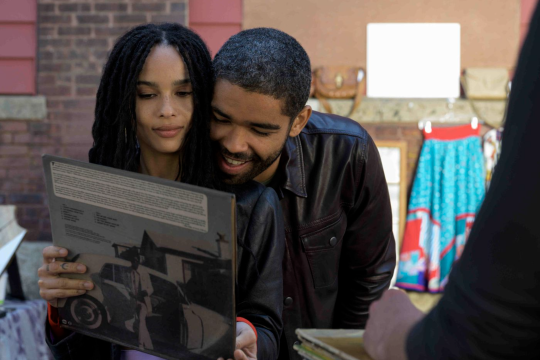
High Fidelity’s endurance as both a piece of IP and a flashpoint for media discourse is mildly baffling for obvious reasons. For one thing, its cultural milieu is actually dated. Even correcting for vinyl’s recent financial resurgence, the idea of snooty record store clerks passing judgment on customer preferences has more or less gone the way of the dodo. With the Internet came the democratization of access, ensuring that the cultivation of personal taste is no longer laborious or expensive, or could even be considered particularly impressive (if it ever could have been). Secondly, as one might imagine, some of Hornby’s insights into heterosexual relationships and the differences between men and women, even presented through the flawed, self-deprecating interiority of High Fidelity’s main character, are indeed reductive. Frears’ film actually strips away the vast majority of Hornby’s weaker commentary, but the novel does include such cringeworthy bits like, “What’s the deal with foreplay?” that are best left alone.
Accounting for all of that, though, it’s remarkable how many misreadings of Hornby’s text have been accepted as conventional wisdom. It’s taken as a given by many that the novel and film earnestly preach the notion that what you like is more important than what you are like when, in fact, the narrative arc is constructed around reaching the opposite conclusion. (The last lines of the novel and film are, literally, “…I start to compile in my head a compilation tape for her, something that’s full of stuff she’s heard of, and full of stuff she’d play. Tonight, for the first time ever, I can sort of see how it’s done.”) That’s relatively minor compared to the constant refrain that Rob’s narcissism goes uncriticized, even though the story’s thematic and emotional potency derives from what the audience perceives that Rob cannot. To put it bluntly, High Fidelity’s central irony revolves around a man who listens to music for a living being unable to hear the women in his life.

While Hornby’s prose immerses the reader in Rob’s interior monologue, providing ample room for the character to spout internal justifications of his behavior, the novel hardly obscures or conceals this conclusion. Moreover, the film makes it unavoidably explicit in numerous scenes. Rob (John Cusack) triumphantly pantomimes Rocky Balboa’s boxing routine soundtracked to Queen’s “We Are The Champions” after his ex-girlfriend Laura (Iben Hjejle) confirms she hasn’t yet slept with her new boyfriend Ray (Tim Robbins), but doesn’t hear the part where she says she prefers to sleep next to him. When Laura informs Rob that she did eventually sleep with Ray, Rob completely falls apart. In an earlier, more pointed scene, Rob goes out with his ex-girlfriend from high school (Joelle Carter) to ask why she chose to have sex with an obnoxious classmate instead of him. She venomously informs him that he actually broke up with her because she was too prudish, an abrupt, cruel bit of business we actually witness at the film’s beginning. It was in her moment of heartbroken vulnerability that she agreed to quickly sleep with someone else (“It wasn’t rape because I technically said, ‘Okay,’ but it wasn’t far off,” she sneers), which ultimately put her off sex until after college. Rob doesn’t hear this explanation or the damning portrait of his teenaged self. Instead, he’s delighted to learn that he wasn’t actually dumped.
These are evidently low character moments, one’s that are comedic in their depiction of blinkeredness but whose emotional takeaways are crystal clear, and one’s that have been written about before. My personal pick from the film, though, comes late when Rob attends Laura’s father’s funeral. He sits in the back and, in typical fashion, turns to the camera to deliver a list of songs to play at his funeral, concluding with his professed wish that “some beautiful, tearful woman would insist on ‘You’re The Best Thing That Ever Happened to Me’ by Gladys Knight.” It’s a really galling, egotistical moment that still makes me wince despite having seen the movie umpteen times. Yet, it’s immediately followed by the casket being lowered to the ground as Laura’s sobs ring out in the church. In a movie defined by John Cusack’s vocal timbre, it’s one of the few times when he completely shuts up. From two-thirds down the center aisle, Frears’ camera pushes into Cusack’s face until tears in his eyes are visible, but what you really see is an appropriately guilt-ridden, ashamed expression.
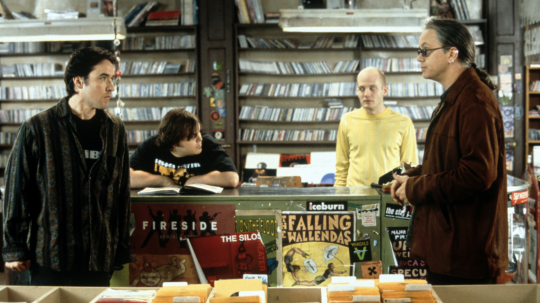
However, none of this evidence carries any weight if your objection to High Fidelity is that Rob suffers no material consequences for his behavior. While Rob is frequently called out for his actions, he is never actively punished. He doesn’t, say, receive a restraining order for continually calling Laura after they’ve broken up or end up alone mending a permanent broken heart because of his past relationships. By the end, Rob and Laura get back together and Rob even starts an independent record label on the side. It’s a stretch to characterize Hornby’s High Fidelity as a redemption tale, but it is a sideways rehabilitation narrative with a happy ending that arises at least partly out of mutual exhaustion.
Those two elements—Rob’s asshole recovery and the exhausted happy ending—rarely seem to factor into High Fidelity discourse. Granted, there’s credence to the idea that, socially and culturally, people have less patience for the personality types depicted in High Fidelity, and thus are less inclined to extend them forgiveness, let alone anything resembling retribution. I suppose that’s a valid reaction, one against which I have no interest in arguing, but it’s somewhat ironic that High Fidelity has endured for reasons that have nothing to do with its conclusions regarding inflexible personal principles and the folly of escapism. Both the book and film are specifically about someone who slowly comes to terms with accepting reality rather than live in a world mediated by pop cultural fantasies whose unrealistic expectations have only caused personal suffering. It’s not unfair to characterize this as a fairly obvious epiphany, but considering we currently live in a world dominated by virtual echo chambers with an entertainment culture committed to validating arrested adolescence, it retroactively counts as “mature” and holds more weight than it otherwise should.
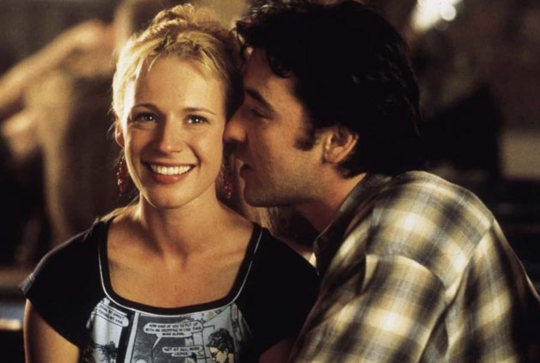
Near the end of High Fidelity, the book, after Rob and Laura have gotten back together in the aftermath of Laura’s father’s death, Hornby includes a chapter featuring five conversations between the couple unpacking the state of their relationship. During the third conversation, Rob and Laura fight about how she doesn’t care about music as strongly as he does, catalyzed by Rob’s objection to Laura liking both Solomon Burke and Art Garfunkel, which, in his mind, is a contradiction in terms. Laura finally admits that not only does she not really care about the difference between them, but that most people outside of his immediate circle of two don’t care about the difference, and that this mentality is indicative of a larger problem. It’s part of what keeps him stuck in his head and reluctant to commit to anything. “I’m just trying to wake you up,” she says. “I’m just trying to show you that you’ve lived half your life, but for all you’ve got to show for it you might as well be nineteen, and I’m not talking about money or property or furniture.”
I fell for High Fidelity (first the movie, then the book) as a younger man for the reasons I assume most sensitive-cum-oblivious, culturally preoccupied straight guys do: it accurately pinpoints a pattern of music consumption and organizationally anal-retentive behavior with which I’m intimately familiar. I spent the vast majority of my early years listening to and cataloguing albums, and when I arrived at college, I quickly fell in with a small group of like-minded music obsessives. We had very serious, very prolonged discussions filled with impossibly strong opinions about our favorite artists and records. Few new releases came and went without them being scrutinized by us, the unappreciated scholars of all that is righteous. List-making wasn’t in vogue, but there wasn’t a song that passed us by that we didn’t judge or size up. I was exposed to more music during this relatively short period of time than I likely will ever absorb again. Some of these times were the most engaging and fun of my life, and I still enjoy discussing and sharing music with close friends, but I’m not such a true believer to fully feel comfortable with this behavior. It’s not entirely healthy on its own and definitely alienating to others, and there comes a point when you hear yourself the way a stranger might, or maybe even catch a glimpse of someone’s eyes when you’re midst rant about some stupid album, and realize, “That’s all there is of me. There isn’t anything else.”

This is what Rob proclaims to Laura in the conversation when she tells him she was more interested in music during their courtship than she is now. It’s a patently self-pitying statement on his part that doesn’t go unchallenged by her in the moment or bear fruit in the rest of the novel. Yet, it’s this type of uncomfortably relatable sentiment that goes under-discussed. If High Fidelity will continue to have a life well after its cultural moment has passed, then it’s worth addressing what it offers on its own terms. Near the end of the book, Laura introduces Rob to another couple with whom he gets along quite well. When the evening comes to an end, she tells him to take a look at their record collection, and it’s predictably filled with artists he doesn’t care for, e.g. Billy Joel, Simply Red, Meat Loaf. “'Everybody’s faith needs testing from time to time,” Laura tells him later when they’re alone. Amidst Rob’s self-loathing and sullen pettiness, Hornby argues that one should contribute in some way rather than only consume and that, at some point, it’s time to put away childish ideas in order to get the most out of life. It’s an entirely untrendy argument, one that goes against the nostalgic spirit of superhero films and reboot culture, but it doesn’t lack merit. Accepting that some values aren’t conducive to a full life, especially when it’s shared with someone else, doesn’t have to mean abandoning interests or becoming an entirely different person. It just means that letting go isn’t an admission of defeat.
It’s why I’ve always found the proposal scene in the film to be quite moving, albeit maybe not specifically romantic. It plays out similarly in both the book and the film, but the film has the added benefit of Cusack and Hjejle’s performances to amplify the vulnerability and shared understanding. Laura meets Rob for a drink in the afternoon where he sheepishly asks if she would like to get married. Laura bursts out laughing and says that he isn’t the safest bet considering he was making mixtapes for some reporter a few days prior. When asked what brought this on, Rob notes that he’s sick of thinking about love and settling down and marriage and wants to think about something else. (“I changed my mind. That’s the most romantic thing I’ve ever heard. I do. I will,” she sarcastically replies.) He goes on to say that he’s tired of fantasizing about other women because the fantasies have nothing to do with them and everything to do with himself and that it doesn’t exist never mind delivering on its promise. “I’m tired of it,” he says, “and I’m tired of everything else for that matter, but I don’t ever seem to get tired of you.”
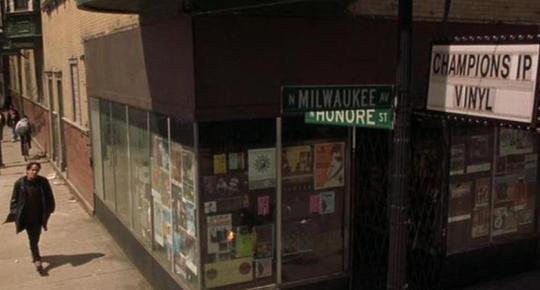
This sort of anti-Jerry Maguire line would be callous if Laura didn’t basically say the same thing to him when they got back together. (“I’m too tired not to be with you.”) It’s possible to read this as an act of mutual settling, but I always thought Hornby’s point was personal growth and accepting one’s situation were intertwined. The key moment in High Fidelity, the film, comes when Laura finds Rob’s list of top five dream jobs. (In the book, Laura makes Rob compile the list.) At the bottom of the list, after such standard choices like music journalist and record producer, lies architect, a job that Rob isn’t entirely sure about anyway. (“I did put it at number five!” he insists.) Laura asks Rob the obvious question: wouldn’t you rather own your own record store than hypothetically be an architect, a job you’re not particularly enthused with anyway?
It’s Laura who convinces Rob that living the fifth-best version of your life can actually be pretty satisfying and doesn’t have to be treated like a cruel fate worse than death. Similarly, Rob and Laura both make the active decision to try to work things out instead of starting over with someone else. Laura’s apathy may have reunited them, and Rob’s apathy might have kept him from running, but it’s their shared history that keeps them together. More than the music and the romance, High Fidelity follows the necessary decisions and compromises one has to maneuver in order to grow instead of regress. “I’ve been letting the weather and my stomach muscles and a great chord change in a Pretenders single make up my mind for me, and I want to do it for myself,” Rob says near the end of Hornby’s novel. High Fidelity’s emotional potency lies in taking that sentiment seriously.
